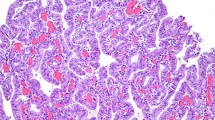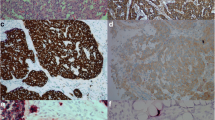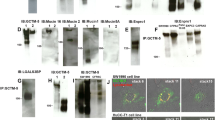Summary
The expression of the gastrointestinal cancer-associated antigens CA 19-9 and CA-50 was studied in 43 ductal pancreatic carcinomas, 1 mutinous cystadenoma, 1 signet-ring-cell carcinoma, 42 pancreata with chronic pancreatitis, and 10 normal fetal and adult pancreata. The anti-CA-50 antibody gave a more intense and more uniformly distributed staining of the ductal epithelial cells than the anti-CA 19-9 antibody. Both antigens, however, exhibited the same staining pattern of ductal epithelial cells in normal pancreas and chronic pancreatitis. Well differentiated carcinomas showed a predominantly membrane-bound antigen expression, whereas moderately and poorly differentiated carcinomas gave a more diffuse cytoplasmic staining. Epithelial dysplasia could not be differentiated by the staining pattern from normal, hyperplastic, metaplastic, or neoplastic cells. The immunohistochemical reaction with these anticarbohydrate antibodies, therefore, does not allow a qualitative discrimination between chronic pancreatitis and pancreatic carcinoma. CA 19-9, which expression depends on the Lewis gene, was negative in two patients with Lea-b- phenotype. Although anti-CA-50 antibody was reactive with the cancer cells of these 2 patients, the staining was weak and heterogenous.
Similar content being viewed by others
References
Arps H, Dietel M, Klapdor R, Kremer B. Immunhistologische Expression der neuen tumorassoziierten Antigene CA 19-9, CA 125, CA 17-1A and CA-50 in gastrointestinalen Tumoren-Spezifität und Sensitivität. In Greten H, Kalpdor R, Klinische Relevanz neuer monoklonaler Antikörper, 3. Hamburger Symposium über Tumormarker, Thieme Verlag, Stuttgart, 1986.
Atkinson BF, Ernst CS, Herlyn M, Steplewski Z, Sears HF. Gastrointestinal cancerassociated antigen in immunoperoxidase assay, Cancer Research, 1982; 42: 4820–4823.
Becker V. Chronische Pankreatitis. Klinische Morphologie, Gastroenterologie und Stoffwechsel, Band 21, Thieme Verlag, Stuttgart-New York, 1984.
Dienst C, Clodius T, Oldörp T, Uhlenbruck G, Diehl V. CA 19-9, CA-50 und CEA bei Pankreas- und Gastrointestinaltumoren. Vergleichende Untersuchungen, Med. Klin., 1987; 82: 45–50.
Dietel M, Arps H, Müller-Hagen S, Klapdor R, Sieck M, Hoffmann L. Antigen detection by the monoclonal antibodies CA 19-9 and CA-125 in normal and tumor tissue and patients’ sera, J. Cancer Res. Clin. Oncol., 1986; 111: 257–265.
Dietel M, Arps H, Müller-Hagan S, Kalpdor R, Sieck M, Hoffmann L. Vergleichende Untersuchungen der Tumormarker CA-125, CA 19-9, CEA, CA 17-1A und CA-50 in Gewebeschnitten von Ovarialtumoren und den zugehörigen Patientenseren. In: Greten H, Klapdor R. Klinische Relevanz monoklonaler Antikörper, 3. Hamburger Symposium über Tumormarker, Thieme Verlag, Stuttgart, 1986.
Farini R, Fabris C, Bonvicini P, Piccoli A, Del Favero G, Venturini R, Panucci A, Naccarato R. CA 19-9 in the differential diagnosis between pancreatic cancer and chronic pancreatitis, Eur. J. Cancer Clin. Oncol., 1985; 21: 429–432.
Geyer G, Scheibner C. Untersuchungen über die alkalische Hydrolyse von Nukleinsäuren im Gewebeschnitt. IV. Abbaueffekte an Kohlenhydratverbidungen nach verstärkter Hydrolyse. Zugleich ein Beitrag zur Histochemie der Glykokalix, Acta histochem., Jena, 1970; 37: 148–153.
Haglund C, Lindgren J, Roberts PJ, Nordling S. Gastrointestinal cancer-associated antigen CA 19-9 in histological specimens of pancreatic tumours and pancreatitis, Br. J. Cancer, 1986; 53: 189–195.
Haglund C, Lindgren J, Roberts PJ, Nordling S. Tissue expression of the tumour marker CA-50 in benign and malignant pancreatic lesions. A comparison with CA 19-9, Int. J. Cancer, 1986; 38: 841–846.
Haglund C, Roberts PJ, Lindgren J, Jalanko H, Kunsel AP, Nordling S. Serum concentration and tissue expression of CA 19-9 and CA-50 in pancreatic cancer, 4. Hamburger Symposium über Tumormarker. Ed.: Greten H, Klapdor R. Thieme Verlag, Stuttgart, 1987.
Heptner G, Domschke S, Schneider MU, Siegfried W, Domschke W. Vergleich der Tumormarker CA-50 and CA 19-9 bei benignen und malignen Erkrankungen des oberen Gastrointestinaltraktes, Dtsch. med. Wschr., 1986; 111: 374–378.
Herlyn M, Shen JW, Sears HF, Civin CI, Koprowski H. Detection of a circulating gastrointestinal cancer antigen in sera of patients with gastrointestinal malignancies by a double determinant immunoassay with monoclonal antibodies against human blood group determinants, Clin. Exp. Immunol., 1984; 55: 22–35.
Holmgren J, Lindholm L, Persson B, Lagergard T, Nilsson O, Svennerholm N, Unsgaard B, Yngavson F, Petterson S, Killander AF. Detection by monoclonal antibody of carbohydrate antigen CA-50 in serum of patients with carcinoma, Br. med. J., 1984; 288: 1479–1482.
Klöppel G, Lingenthal G, von BülowM, Kern HF. Histological and fine structural features of pancreatic ductal adenocarcinomas in relation to growth and prognosis: studies in xenografted tumours and clinico-histopathological correlation in a series of 75 cases, Histopathology, 1985; 9: 841–856.
Koprowski H, Herlyn M, Steplewski Z, Sears HF. Specific antigen in serum of patients with colonoc carcinoma. Science, 1981; 212: 53–54.
Lindholm L, Holmgren J, Svennerholm L, Fredman P, Nilsson O, Persson B, Myrvold H, Lagergard T. Monoclonal antibodies against gastrointestinal tumour-associated antigens isolated as monosialogangliosides, Int. Arch. Allergy appl. Immun., 1983; 71: 178- 181.
Magnani JL, Nilsson B, Brockhaus B, Zopf D, Steplewski Z, Koprowski H, Ginsburg Y. A monoclonal antibody defined antigen associated with gastrointestinal cancer is a ganglioside containing sialylated lacto-N-fucopentaose II, J. Biol. Chem., 1982; 257: 14365- 14369.
Makovitzky J. The localization and distribution of the carbohydrate antigen 19-9 (CA 19-9) in chronic pancreatitis and pancreatic carcinoma, Virchows Arch. (Cell. Pathol.), 1986; 51: 535–544.
Mansson JE, Fredman P, Nilsson O, Lindholm L, Holmgren J, Svennerholm L. Chemical structures of carcinoma ganglioside antigens defined by monoclonal antibody C-50 and some allied gangliosides of human pancreatic adenocarcinoma, Biochem. Biophys. Acta, 1985; 834: 110–117.
Nilsson O, Mansson JE, Lindholm L, Holmgren J, Svennerholm L. Sialolyllactotetra-osylceramide, a novel monoclonal antibody defined ganglioside antigen detected in human carcinomas, FEBS Lett., 1985; 182: 398–402.
Pasquali C, Sperti C, d’Andréa AA, Catalini S, de Luca A, Bonadimani B, Cappellazzo F, Pedrazzoli S. The tumor-associated antigen CA-50 in the differential diagnosis of chronic pancreatitis (ChP) and pancreatic cancer (PC). Comparison with CA 19-9 and CA-125, XVIII Meeting of the European Pancreatic Club, 1986 (Abstract).
Pour PM, Uchida E, Takahashi H, Tempero MA. Blood group antigenicity of gastrointestinal cancer, 4. Hamburger Symposium über Tumormarker. Ed.: Greten H, Kalpdor R. Thieme Verlag Stuttgart, 1987.
Pour PM, Takasaki H, Büchler M. Immunologie der akuten und chronischen Pankreatitis, Verh. Dtsch. Ges. Path., 1987; 71: 255–265.
Pugliese V, Paganizzi M, Aste H, Ferrara GB, Santi L. A clinical evaluation of the tumorassociated antigens CA-50 and CA 19-9 in benign and malignant pancreatobiliary diseases, Digestive Diseases and Sciences, 1986; (Suppl.) 81: 68.
Quintarelli G, Tsuiki S, Hashimoto Y, Pigman W. Histochemical studies of bovine salivary gland mucins, Biochem. Biophys. Res. Comm., 1960; 2: 423–433.
Romhanyi G. Differences in ultrastructural organization of amyloid as revealed by sensitivity or resistance to induced proteolysis, Virchows Arch. (Path. Anat.), 1972; 357: 29–52.
Schmiegel H, Eberl W, Kreiker C, Kalthoff H, Bützow GW, Jessen K, Klapdor R, Soehendra N, Wargenau M, Classen M, Greten H, Thiele HG. Multiparametric tumor marker (Ca 19-9, CEA, AFP, POA) analyses of pancreatic juices and sera in pancreatic diseases, Hepato-gastroenterol., 1985; 32: 141–145.
Stolte M, Volkholz H, Becker V. Zur Differentialdiagnose Chronische Pankreatitis und Pankreascarcinom, Verh. Dtsch. Ges. Pathol., 1979; 63: 671.
Uhlenbruck G, Hanisch FG, Vierbuchen M, Dienst C. Biochemistry and histochemistry of new tumor markers (CA-125, CA 19-9, CA-50)—Relation to blood group antigens, 4. Hamburger Symposium über Tumormarker. Ed.: Greten H., Klapdor R. Thieme Verlag, Stuttgart, 1986.
Volkholz H, Stolte M, Becker V. Epithelial dysplasias in chronic pancreatitis, Virchows Arch. (Pathol. Anat.), 1982; 396: 331–349.
Author information
Authors and Affiliations
Rights and permissions
About this article
Cite this article
Schwenk, J., Makovitzky, J. Tissue expression of the cancer-associated antigens ca 19-9 and ca-50 in chronic pancreatitis and pancreatic carcinoma. Int J Pancreatol 5, 85–98 (1989). https://doi.org/10.1007/BF02925701
Received:
Revised:
Accepted:
Issue Date:
DOI: https://doi.org/10.1007/BF02925701




